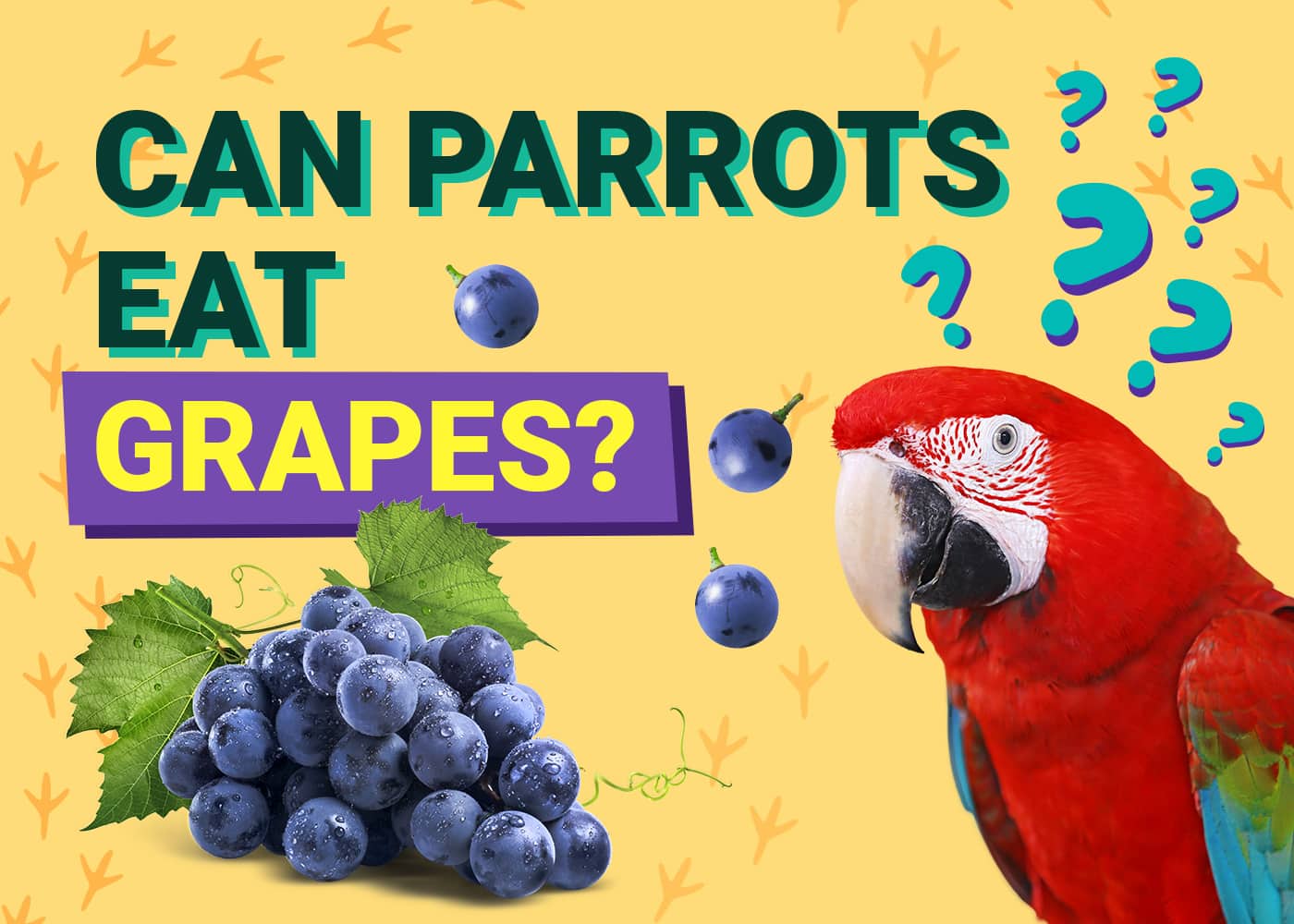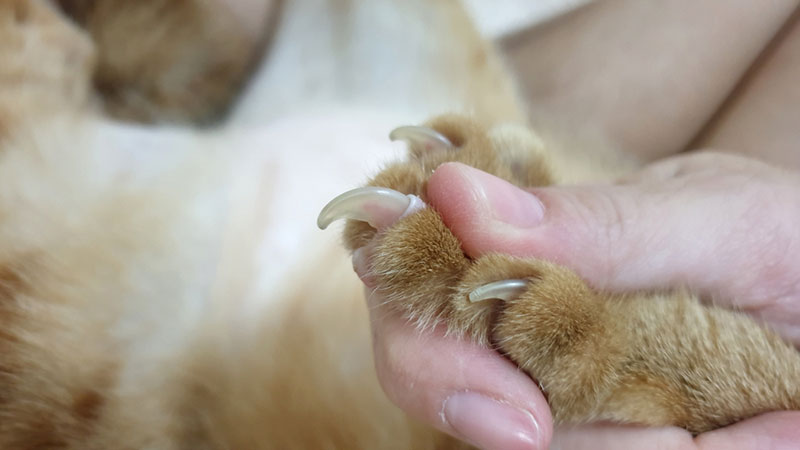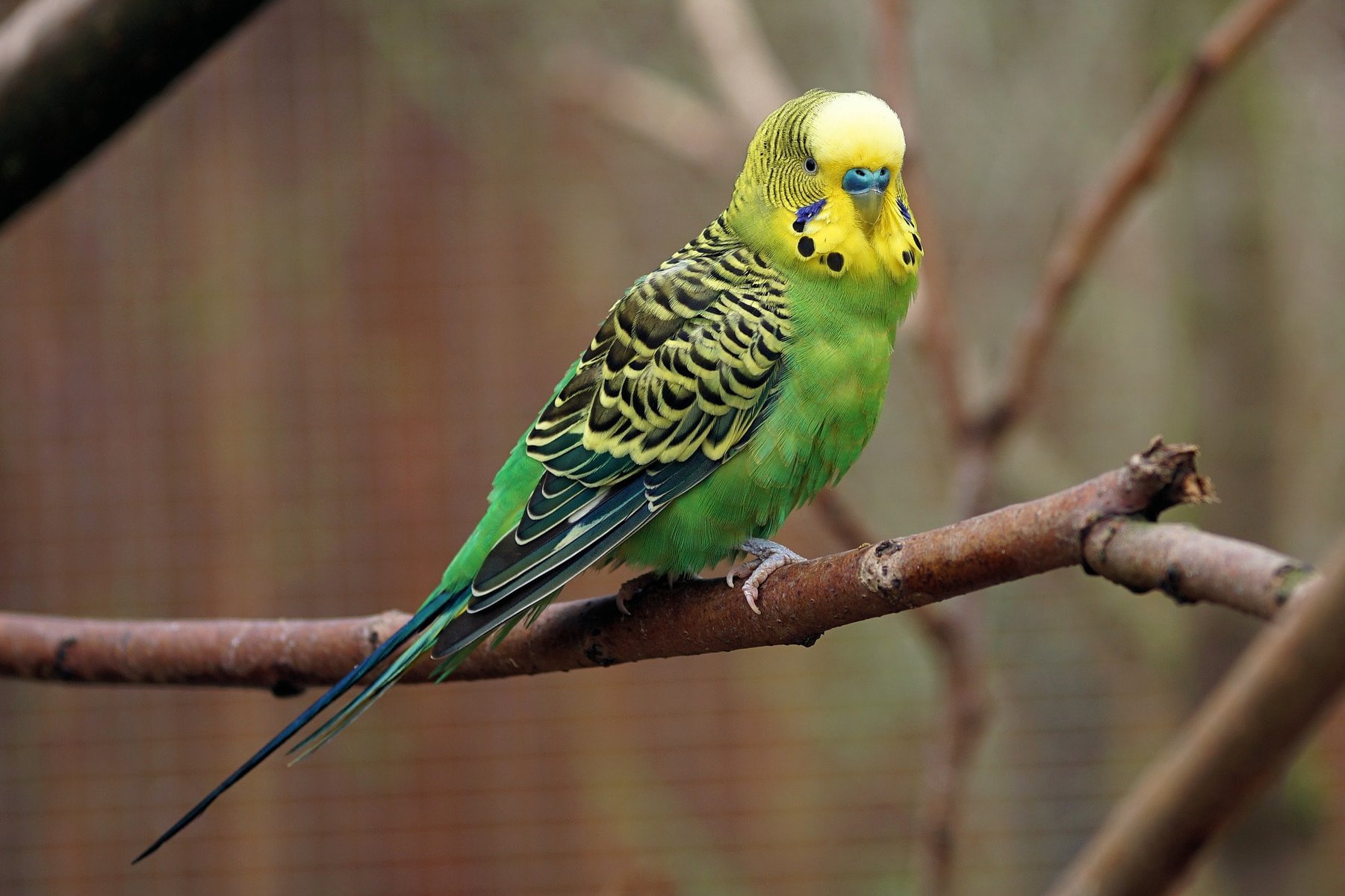VET APPROVED

The information is current and up-to-date in accordance with the latest veterinarian research.
Learn more »Click to Skip Ahead
If your parrot always eyes your grapes while you’re munching away and tries to snatch one, maybe you’ve wondered if it’s okay to give one (or more) to your bird.
Are grapes safe for your parrot to eat? The good news is that grapes are a safe and healthy treat for parrots but should only be fed in moderation, as fruits shouldn’t comprise a large portion of a pet parrot’s diet. In this article, we look at the good and the bad of the grape and how much is the right amount for your parrot.

Grapes 101
Grapes have been cultivated and enjoyed for thousands of years and are known, of course, for their use in winemaking. They grow in clusters on vines and can have seeds or be seedless and can be pink, green, yellow, red, and even black!
They are cultivated around the world in moderate temperatures in Africa, South America, Australia, Southern Europe, and North America.
Like other fruits, most of the composition of a grape is water. The rest of the nutritional yield of the fruit includes carbohydrates (in the form of naturally occurring sugars), alongside other vitamins and minerals. The exact nutritional composition of a grape depends on its specific cultivar and the conditions in which it is grown.
Let’s look at 100 grams of two popular grapes for comparison: the seedless green and the seedless red grape.
| Parameter of Interest | Seedless Green Grapes | Seedless Red Grapes |
| Total Energy (kcal) | 72 | 77 |
| Water (grams) | 79.9 | 78.2 |
| Carbohydrates (grams) | 18.6 | 20.2 |
| Sugars (grams) | 16.1 | 17.3 |
| Protein (grams) | 0.9 | 0.91 |
| Fat (grams) | 0.23 | 0.16 |
The general consensus on grapes is that they’re moderately high in sugar, which makes them a less than ideal choice for supplementing your parrot’s diet for the vitamins and minerals they may provide. Specifically, they are not as ideal as berries (in the context of a fruit), and are not preferred over vegetable options.
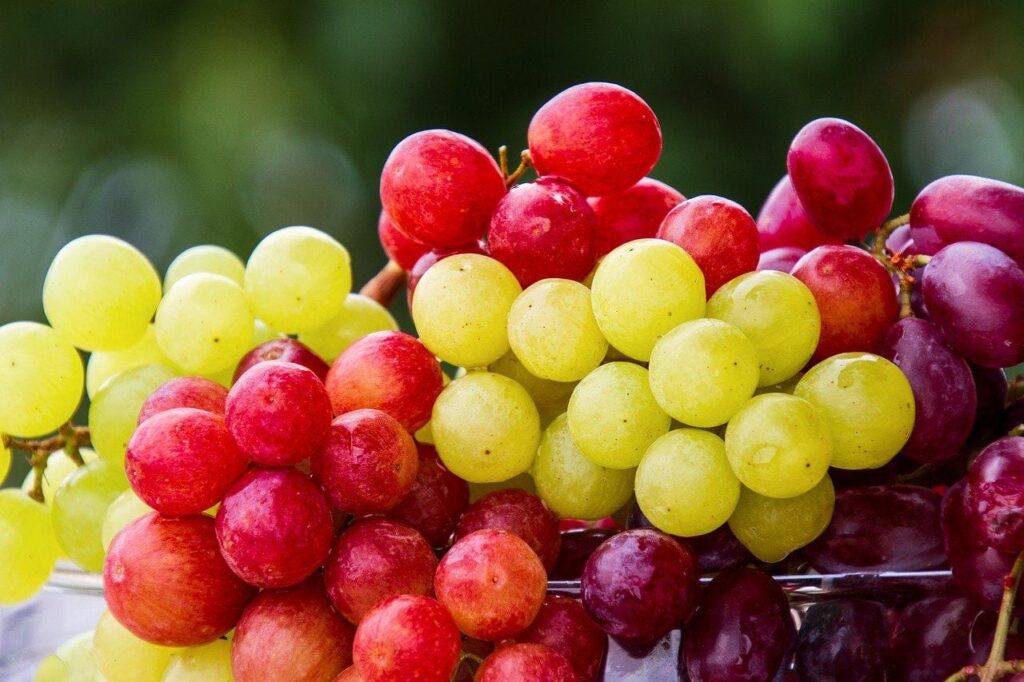
A Parrot’s Diet
Your pet parrot’s diet will depend on several factors. Just like us, our pets are unique biological entities, and the advice or nutritional guidelines that work for one parrot might not work for another. Consider the following factors, which play a role in determining your parrot’s nutritional needs.
- Species
- Age
- Molting status
- Reproductive status
- Current body condition score and weight
- Purpose of the diet
- Current exercise levels
- Medical history
- Current diagnoses (if any)
- Medication (former and current)
- Ambient temperature
- Duration of sunlight exposure per day
Please note that the list above isn’t comprehensive. With so many factors at play, most veterinarians recommend a general guide for pet parrots as a starting point for understanding their nutritional needs.
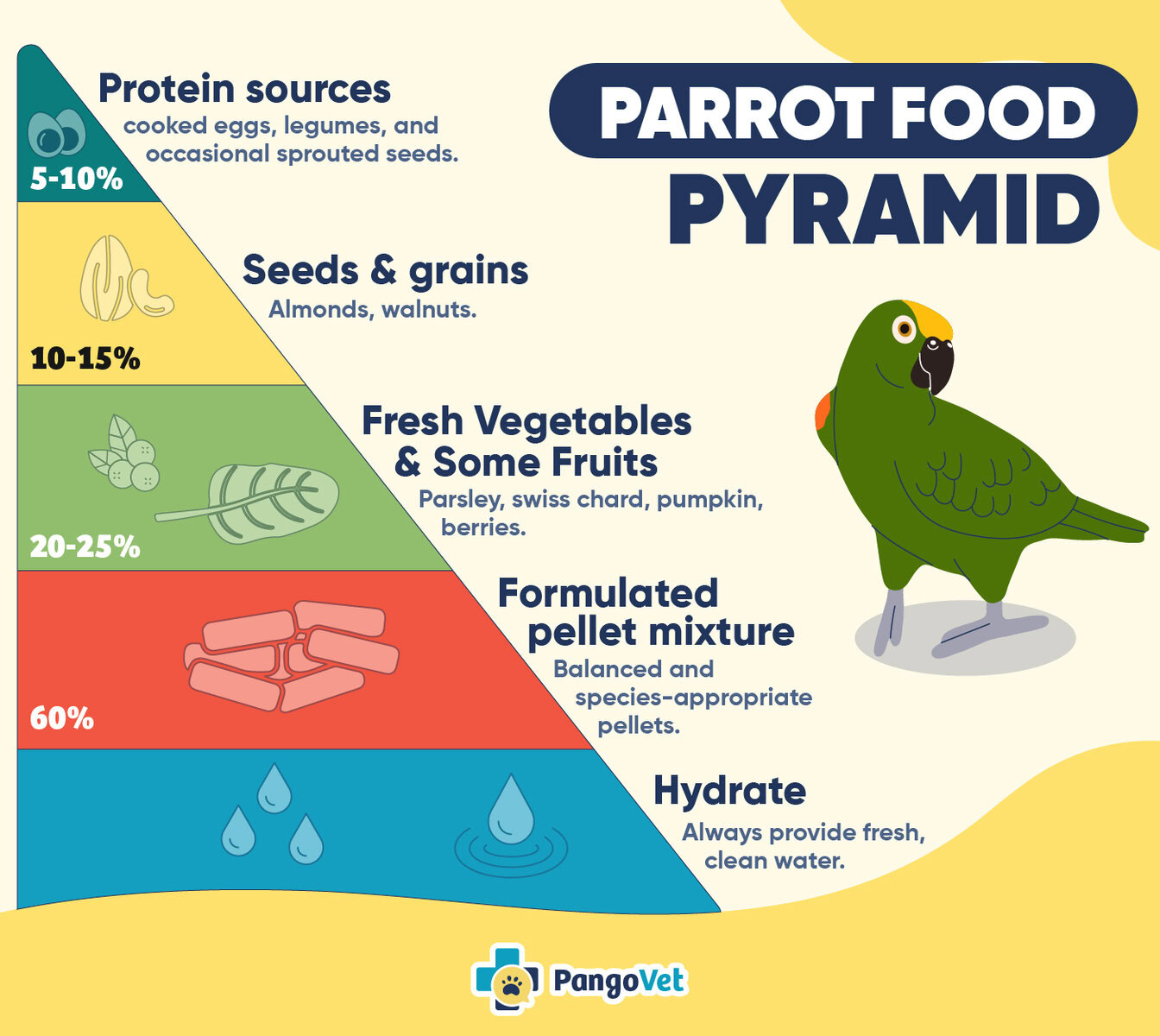
Benefits of Grapes for Parrots
Fruits should definitely be considered for your parrot (in most cases). Grapes are safe for parrots to consume and may offer them some benefits.
- Water: Like all fruits, grapes are high in their water content. Though they’re certainly not a replacement for drinking water, they may serve as a source of additional hydration for your pet.
- Energy: The high sugar content of grapes does provide your pet energy (though in some cases this ends up working against them).
- Enrichment: Parrots that enjoy grapes will definitely be elated to see them; being offered grapes would serve as a form of enrichment for such parrots.
- Vitamins & Minerals: Grapes do contain various vitamins and minerals which may help your parrot acquire these micronutrients. However, given how fruits usually aren’t a large portion of a parrot’s diet, this benefit is likely not enormous.
- Antioxidants: Perhaps the greatest appeal of grapes is that they contain antioxidants, which help with a myriad of biochemical processes within the body and play a role in health by mitigating free radical damage. This could be why birds are thought to pick and choose “antioxidant rich” foods based on their color (more on that shortly).

The 3 Downsides of Grapes for Parrots
Grapes in moderation may offer your parrot some health benefits, but if you feed your parrot too many, there are negative consequences. Examples of such downsides include the following:
1. Selection Bias
If your parrot frequently has free liberty of picking and choosing their favorite foods all the time, they may preferentially begin to eat those foods first, and eventually, may become conditioned to only eating those foods. This can happen if you have a parrot who happens to love grapes and you happen to offer them grapes all the time.
The consequences of such a feeding style is that it eventually leads to nutritional deficiencies and a bird that would refuse to eat anything else. Untraining this habit is very difficult and almost always requires an expert trainer’s input.
2. Obesity
A fundamental risk with almost all fruits is that their high sugar content and caloric yield coupled with the low amount of exercise most pet parrots receive means that a parrot who overindulges in fruit may eventually end up being overweight or obese.
Obesity is associated with many other diseases in parrots and is generally an implicating factor in untimely deaths and an overall poor quality of life in pet birds.
3. Pesticides
Grapes, of course, can be covered in pesticides to help protect the crop from pests. Pesticides can be quite harmful to parrots. Some people try to combat this by buying only organic foods for their parrots. While well-intentioned, it’s important to keep in mind that “organic” doesn’t always mean “safe.”
As such, any fruit you should offer your pet should be thoroughly washed before you feed it to them. As a rule, if you wouldn’t eat it, your parrot shouldn’t either.
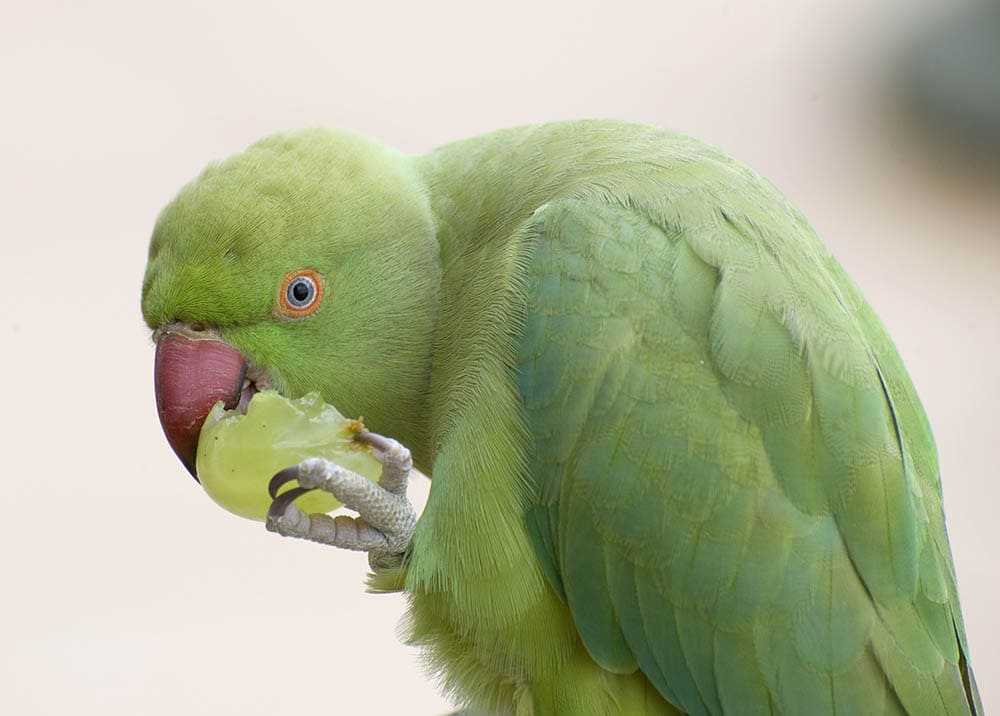
What About the Color of the Grapes?
The hard-and-fast rule is that the darker the grape, the more antioxidants and, therefore, the healthier it is. Perhaps most interesting here is that birds often tend to show a preference for darker fruits to possibly acquire more antioxidants.
Suffice it to say, the odds of your parrot favoring darker grapes (when given an option) are moderately high. Then again, since grapes shouldn’t form a large part of their diet, this benefit would also not be as impactful as you might hope. Therefore, the color of the grape doesn’t really matter in the grand scheme of things.

Conclusion
Grapes are a nice treat for your parrot, as long as you remember that they shouldn’t form a large majority of their diet. Like all fruits, moderation is key when it comes to grapes and your parrot.
If you need extra advice or if your parrot binged on grapes behind your back, do speak to your vet. It’s always better to be safe rather than sorry. Your veterinarian should also be your first point of contact when it comes to figuring out your parrot’s precise nutritional needs.
Related Reads:
Featured Image Credit: GoranH, Pixabay
